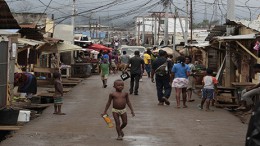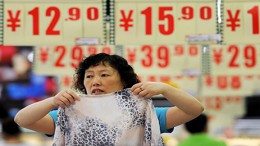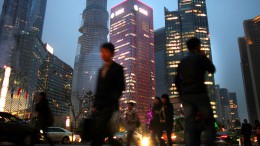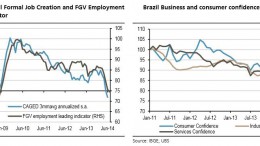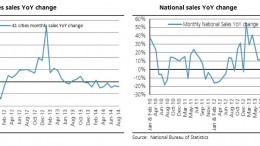World economy
In depth- Russia: sanctions for peace
BRUSSELS | By Jacobo de Regoyos | Europe’s 28 have unanimously requested at their recent summit to the Commission to prepare new economic sanctions against Russia, which will be triggered if the tension in Eastern Ukraine is not reduced. “Further significant steps,” is written on the statement. But nobody really knows how far can go the difficult consensus knitting machine that the European Union has become, divided between the dread to Russia felt by Eastern countries and the economic interests that grip the continental West. (Note from the editor: The cartoon above was published in Chinese official newspaper China Daily).
Galileo: Europe’s struggle to be in orbit
MADRID | By Álex García | Had budget cuts anything to do with Galileo’s two satellites failed operation in August?
In depth: Equatorial Guinea on the brink
By Donato Ndongo-Bidyogo | On 24 July, thousands of students took for several hours the precincts of the National University of Equatorial Guinea (UNGE) and made it to the streets of Malabo. An unusual fact, they were demanding the payment of their grants. Although the Army and police forcefully repressed the demonstrations, the government reaction was far from the bloodbath occurred in December 1992, when more than a hundred of students, teachers, opponents and priests were tortured in police stations. Now President Teodoro Obiang hurried to meet the demands of students and national oil company’s GEPETROL workers, who were missing several months’ wages.
Deng Xiaoping: A great legacy posing a great dilemma for China
Three decades after admired reformist leader Deng Xiaoping launched his experimental plan of economic reforms, the new Chinese president Xi Jinping is nowadays facing the exact same challenges (and pressures) than his revered comrade. Moreover, Mr Xi’s political survival depends on his ability to earn the trust of the masses and offer them real options for progress. He will have to find a way to do so without tamping the privileges of all those wealthy entrepreneurs who benefited from Mr Deng’s capitalist reforms.
China’s antitrust investigation threatening 25% of car industry’s global benefits
MADRID | The Corner | China’s antitrust investigation on over 1,000 manufacturers and foreign suppliers in China (market of € 450,000 million in revenues) threatens 25% of the sector’s global benefits. In particular, German manufacturers are the most exposed (BMW, Daimler, Audi and Porsche generate 50.000 million euros and account for over 80% of demand for luxury goods). According to Morgan Stanley figures, 80% of the market has been influenced by foreign companies. In the short term Morgan Stanley analysts believe the focus of the problem will centre on imports but generalized cuts in luxury markets are also expected.
China as Responsible Stakeholder or Just ‘Guest’?
Via Caixin | By Miriam L. Campanella | Media outlets have published news that based on a World Bank report China’s economy will be the world’s largest in terms of purchasing parity power (PPP) by the end of 2014. Yet, China itself did not welcome the news. The World Bank included a note in its report that the country’s National Bureau of Statistics contested the methodology and rebuffed the report. The Financial Times even reported how China tried to convince World Bank analysts not to use the data. “China wanted to throw this out,” one source said.
UBS: Brazil’s GDP growth loses momentum
MADRID | The Corner | 2014 is not being a good year for LatAm. All countries in the region with the exception of Colombia have experienced much softer than anticipated growth. In Brazil, the political noise and uncertainty have impacted on the confidence and private activity in 1H201, with investments and private consumption leading the way down. UBS analysts see now Brazil’s real GDP growth at 0.6% in 2014 and 1.5% in 2015.
US residential construction recovers in July
MADRID | The Corner | After two months of decline, US construction rebounds in July at the fastest pace in eight months. As the Commerce Department reported yesterday, the number of housing starts rose 15.7% in July compared to June, reaching an annualized figure of 1.09 million units, the highest in eight months. Meanwhile, applications for building permits in the same month also advanced 8.1% to an annual rate of 1.05 million, after drops of 3.1 percent in June and 5.1 percent in May. Notably the permits to build single-family homes, a segment that accounts for three quarters of the U.S. housing market, increased in July by 0.9% to an annualized figure of 640,000, the highest since December 2013. In addition, permits for units in buildings with five units or more rose 23.6% in July to an annual rate of 382,000, representing its highest growth rate since January 2006.
Further policy easing to support China’s property downturn
MADRID | The Corner | The biggest uncertainty for China’s economy now and in 2015 is the nature and duration of the ongoing property downturn. Following a sharp drop in the beginning of 2014, Chinese property construction has shown signs of improvement in recent months as policies have been increasingly relaxed. Both have provided support for the economy and property related stocks, with the latter rallying by 17% from trough levels. However, UBS analysts expect that the property downturn will weigh more heavily on growth in Q4 and 2015.




